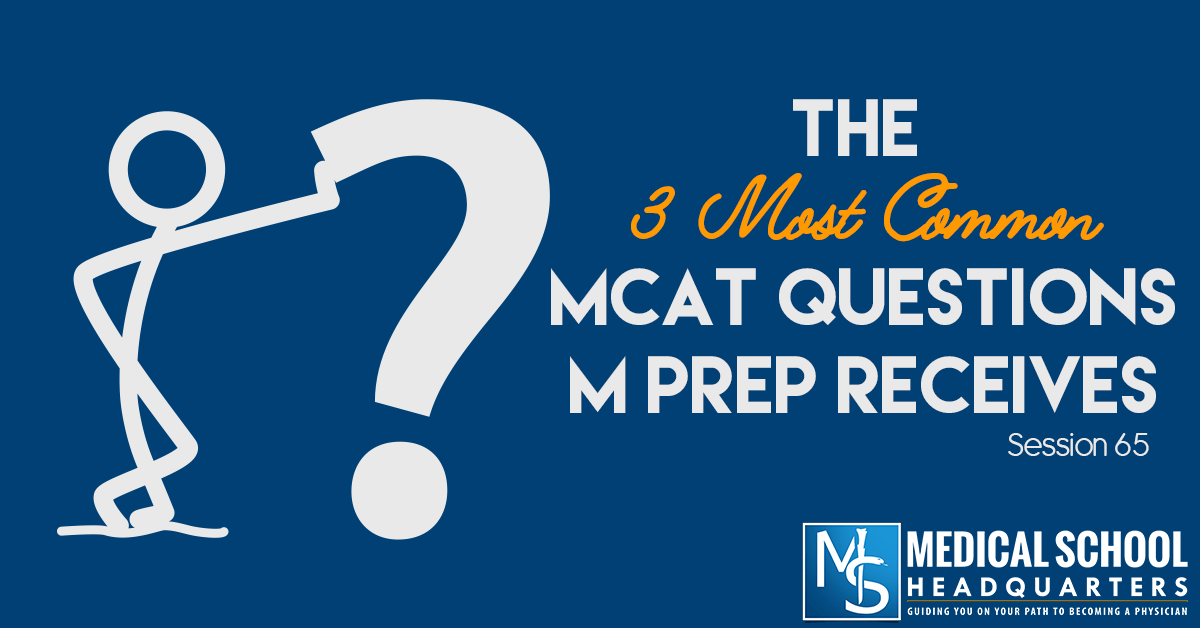
In this episode, I talk with Alec Lee, a former premed and co-founder of M Prep. We discuss the most common MCAT questions they receive, including how many months and hours to study for the MCAT.
Alec has taught 1,500 hours of coursework with students, having been the head instructor of M Prep’s comprehensive course as well as the one who developed most of the course strategy content for their MCAT course.
M Prep is popular for their MCAT Question of the Day service, which sends an MCAT question right to your email inbox. Today, Alex answers the three most common questions that he receives about the MCAT.
Listen to this podcast episode with the player above, or keep reading for the highlights and takeaway points.
This is probably the most common MCAT prep question of all: How long should I study for the MCAT? But of course, the answer is going to be different for everyone. Let’s look at a baseline recommendation for how long to study for the MCAT and then some factors that change the answer from there.
[Related episode: Are There Hidden MCAT Prereqs I Should Take?]
If you’re listening along to this podcast, you’ll notice a section where we talk all about the changes to the MCAT in 2015. Updating this article in 2019, a lot of this content is no longer news.
Late summer/fall test dates are geared towards people who are planning to applying next year and just want to have an extra year to not have to worry about the MCAT and do the other things involved in preparing for the application.
Rolling admissions at medical schools is a game of musical chairs. The longer the game goes, the fewer chairs there are, and the music keeps playing.Click To Tweet[Related episode: What Does the Med School Application Timeline Look Like?]

Lorem ipsum dolor sit amet, consectetur adipiscing elit
I just received my admission to XXXXX! This is unreal and almost feels like I am dreaming. I want to thank you for all of your help with my application. I cannot overstate how influential your guidance and insight have been with this result and I am eternally grateful for your support!
IM SO HAPPY!!!! THANK YOU SO MUCH FOR ALL YOUR HELP, IM INDEBTED TO YOU! Truly, thank you so much for all your help. Thank you doesnt do enough.
I want to take a few moments and thank you for all of your very instructive, kind and consistent feedback and support through my applications and it is your wishes, feedback, and most importantly your blessings that have landed me the acceptance!
I got into XXXXX this morning!!!! It still has not hit me that I will be a doctor now!! Thank you for all your help, your words and motivation have brought me to this point.
I wanted to once again express my heartfelt gratitude for your help in providing feedback during my secondary applications. Your guidance has been instrumental in my journey.
Just wanted to share my wonderful news! I received my first medical school acceptance! Thank you for all that you do for us Application Academy!!!
I am excited to tell you that I just got my third interview invite from XXXXX today! I can’t believe it. I didn’t even know if I was good enough to get one, let alone three – by mid-September. Thank you so much for all of your help and support up to this point; I would not be in this position without it!!
I wanted to thank you for helping me prepare for my XXXXX interview. Even in a 30-minute advising session, I learned so much from you. Thank you for believing in me, and here’s to another potential success story from one of your advisees!
I just received an acceptance with XXXXX! This is so exciting and such a huge relief and so nice to have one of our top choice schools! I also received an interview with XXXXX which brings the total up to 20 interviews! Thank so much, none of this would have been possible without you!